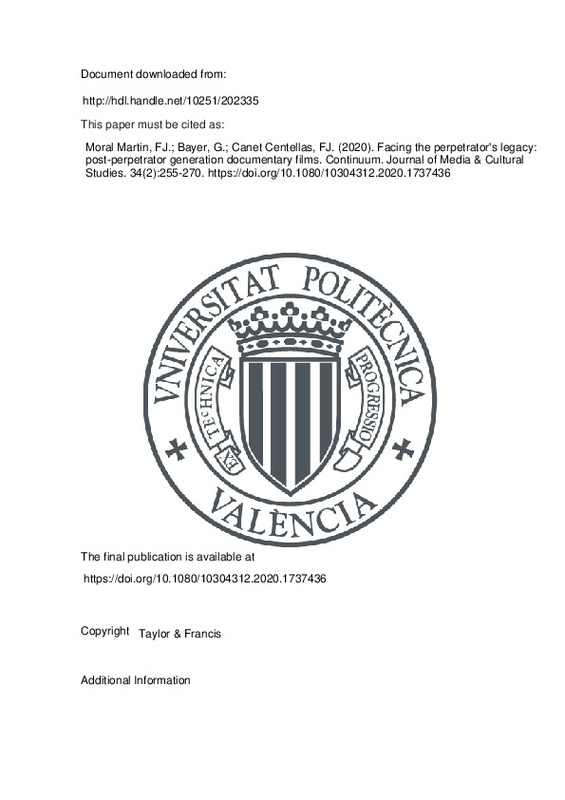JavaScript is disabled for your browser. Some features of this site may not work without it.
Buscar en RiuNet
Listar
Mi cuenta
Estadísticas
Ayuda RiuNet
Admin. UPV
Facing the perpetrator's legacy: post-perpetrator generation documentary films
Mostrar el registro sencillo del ítem
Ficheros en el ítem
| dc.contributor.author | MORAL MARTIN, FRANCISCO JAVIER
|
es_ES |
| dc.contributor.author | Bayer, Gerd
|
es_ES |
| dc.contributor.author | Canet Centellas, Fernando Javier
|
es_ES |
| dc.date.accessioned | 2024-02-05T19:02:16Z | |
| dc.date.available | 2024-02-05T19:02:16Z | |
| dc.date.issued | 2020-03-03 | es_ES |
| dc.identifier.issn | 1030-4312 | es_ES |
| dc.identifier.uri | http://hdl.handle.net/10251/202335 | |
| dc.description.abstract | [EN] The aim of this article is to address a transversal topic within perpetrator studies: how subsequent generations deal with the legacy of their perpetrator ancestors. To achieve it, we analyse six recent documentary films, all produced between 2015 and 2018 that cover four different contexts: Nazi Germany, the Spanish Civil War, and the Chilean and Argentine dictatorships. Through a comparative methodological approach, our focus is on finding similarities that define this global trend through the exploration of two closely related phenomena: (1) Personal responses and social responsibility and (2) Family dynamics. One important outcome of this new cinematic tendency, that we call the 'post-perpetrator generation documentary film', is that by accepting their relatives' involvement, the perpetrator's offspring are able to recover their personal identity, and also to reintegrate their personal experience into a broader historical context. Indeed, the social sphere is an important focus in post-perpetrator generation documentary films, because a major part of the perpetrator's legacy involves social responsibility to the past, but especially to the future: concern for next generations is the ethical motivation of the post-perpetrator generation. | es_ES |
| dc.language | Inglés | es_ES |
| dc.publisher | Taylor & Francis | es_ES |
| dc.relation.ispartof | Continuum. Journal of Media & Cultural Studies | es_ES |
| dc.rights | Reserva de todos los derechos | es_ES |
| dc.subject | Perpetrator | es_ES |
| dc.subject | Second generation | es_ES |
| dc.subject | Third generation | es_ES |
| dc.subject | Legacy | es_ES |
| dc.subject | Authoritarian regime | es_ES |
| dc.subject | Documentary film | es_ES |
| dc.subject | Post-memory | es_ES |
| dc.subject.classification | COMUNICACION AUDIOVISUAL Y PUBLICIDAD | es_ES |
| dc.title | Facing the perpetrator's legacy: post-perpetrator generation documentary films | es_ES |
| dc.type | Artículo | es_ES |
| dc.identifier.doi | 10.1080/10304312.2020.1737436 | es_ES |
| dc.rights.accessRights | Abierto | es_ES |
| dc.contributor.affiliation | Universitat Politècnica de València. Facultad de Bellas Artes - Facultat de Belles Arts | es_ES |
| dc.description.bibliographicCitation | Moral Martin, FJ.; Bayer, G.; Canet Centellas, FJ. (2020). Facing the perpetrator's legacy: post-perpetrator generation documentary films. Continuum. Journal of Media & Cultural Studies. 34(2):255-270. https://doi.org/10.1080/10304312.2020.1737436 | es_ES |
| dc.description.accrualMethod | S | es_ES |
| dc.relation.publisherversion | https://doi.org/10.1080/10304312.2020.1737436 | es_ES |
| dc.description.upvformatpinicio | 255 | es_ES |
| dc.description.upvformatpfin | 270 | es_ES |
| dc.type.version | info:eu-repo/semantics/publishedVersion | es_ES |
| dc.description.volume | 34 | es_ES |
| dc.description.issue | 2 | es_ES |
| dc.relation.pasarela | S\424103 | es_ES |







![[Cerrado]](/themes/UPV/images/candado.png)

